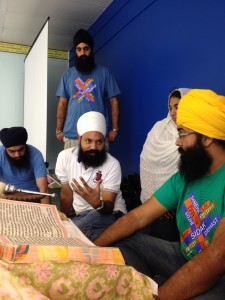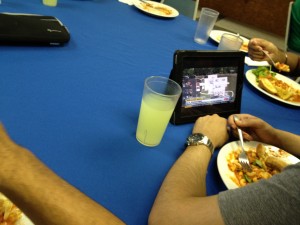
Reflections on Sidak 2012: Apply for Summer, 2013
Two of my fellow Sidakers from the class of 2012 have written wonderful blog posts that are succinct and tell you concisely what their Sidak experience was like. Please do give them a read: Santbir Singh on Sikhchic “Why I’ll Be There.” and Ruby Kaur on Sikhnet with the aptly titled, “Amazing Sidak.” It should come as no surprise that my post about my experience is long, but I’ve inserted photos to hide this fact.
Last July was a busy one for me. I attended a playwriting workshop in Cape Cod, and directly after that, it was off to Texas for two weeks of Sidak, an experience I still find difficult to put into words. It is officially:
“a distinctive leadership development program for young adults seeking to increase their commitment towards the Sikh faith. This two-week intensive immersion in Sikh culture, language, values and community though understanding bÄnÄ« (scripture), tvÄrÄ«kh (history), and rahit (discipline), is held annually in the Hill Country of San Antonio, Texas.â€
There is nothing I disagree with in their description, but to me it is much more than just those things. I first learned about Sidak from a blog post on TLH by Sharandeep Singh, and I was very enticed by the Gurmukhi course. So enticed, I applied, despite my initial reservations. Those reservations were primarily based on the fact that I didn’t fit into the perceived demographic I had pinged in my head as the sort of person who would attend Sidak. I’m not a Sikh active in my community (at least not in the conventional sense), the gurduara, or even someone who had grown up attending Sikh youth camps, except one year at Jakara when I was 30 (http://ow.ly/l2F6X). I’m in my mid-30s, occasionally go to the gurduara, and while I read, write, and speak Punjabi “relatively well,†I am not well versed in Sikh theological terminology. I had no idea what the difference between a tuk, a var, or a bani were, when they’d be used in class or during Divan.
 So, of course, I took the most intensive track: Gurmukhi 101, taught by S.P. Singh, who was surprisingly really funny, very helpful, and thoroughly engaging with the driest material in the world: grammar. His profile photo on the Sikhri site is decidedly very serious, like a Masterji, waiting for you to screw up your pronunciation, so he can take out a wooden bat and smack you one (http://www.sikhri.org/people-staff.html). But he was fantastic. Really patient with all of us, and eager not just to spout off information or to prove how much more he knows than us, which became evident very quickly, but so interested in making sure we understood what was going on. And his tangents were sometimes mesmerizing, other times funny, and always insightful. Often, they were a mix of all three, a feat to pull off.
So, of course, I took the most intensive track: Gurmukhi 101, taught by S.P. Singh, who was surprisingly really funny, very helpful, and thoroughly engaging with the driest material in the world: grammar. His profile photo on the Sikhri site is decidedly very serious, like a Masterji, waiting for you to screw up your pronunciation, so he can take out a wooden bat and smack you one (http://www.sikhri.org/people-staff.html). But he was fantastic. Really patient with all of us, and eager not just to spout off information or to prove how much more he knows than us, which became evident very quickly, but so interested in making sure we understood what was going on. And his tangents were sometimes mesmerizing, other times funny, and always insightful. Often, they were a mix of all three, a feat to pull off.
Most of what we did in the class was dissect grammatical patterns, find some very interesting connections with root words, and understand how transliteration worked. But we’d often take segues, discussions would briefly get into controversial areas, quickly return to our lesson objectives. He even made a point with bani designed just to be a grammatical exercise that our Gurus had a great sense of humour (something I had never even taken into consideration) and he effortlessly cited several banis that illustrated this. And S.P. Singh himself has a really mordant sense of humor that was thoroughly infectious, like when he’d look at you glum-faced when you answered a question correctly, watch as you go through second-guessing yourself, and then declare, “You are right!†During the short breaks, he’d listen to Public Enemy and dissect the lyrics with very amusing, but insightful analysis. “Ehh kehnda ussi rab nu – apna God jeda – onu kuthe varga treat karde ne.†(He is saying that we treat our God like a dog,†referring to Public Enemy’s, “ Is your God a Dog?†track.) (https://www.youtube.com/watch?v=ZO9SOJ-vcgA
 The instructors, as well as fellow Sidakers, do not shy away from controversial topics such as the discussion of meat for amritdhari Sikhs. We were even able to read various rehat maryadas in their original text. All of the instructors, without exception, were great at keeping our interest and keeping us engaged. I never felt there was a moment of busy work. Everything was relevant. I was really surprised that all of the instructors were so passionate about their subject and so readily available to chat. They often just hung out in the langar hall, even after hours, or outside their rooms (which are amazing and super clean).
The instructors, as well as fellow Sidakers, do not shy away from controversial topics such as the discussion of meat for amritdhari Sikhs. We were even able to read various rehat maryadas in their original text. All of the instructors, without exception, were great at keeping our interest and keeping us engaged. I never felt there was a moment of busy work. Everything was relevant. I was really surprised that all of the instructors were so passionate about their subject and so readily available to chat. They often just hung out in the langar hall, even after hours, or outside their rooms (which are amazing and super clean).
Moments after I had arrived at the airport, Inderpreet Singh rolled up in his car to come pick me up. Sitting in the back seat was Ruby Kaur, who had flown in from Philadelphia. We spoke briefly about what brought us to Sidak and gave vague reasons. She was taking Sikhi 101, didn’t speak Punjabi very well, couldn’t read or write Gurmukhi, and wanted to understand Sikhi from the ground up. (Yet she managed to sing a shabad in its entirety by the end of the second week, and followed along with Asa ki Vaar, even without the aid of the iSikhi app, rendered useless if you can’t write Gurmukhi.) I told her I was taking Gurmukhi 101 because although I can read and write Gurmukhi (very slowly), I want to understand the Guru Granth Sahib on a deeper level, particularly its structure, grammar, and poetry.
 During the drive, Inderpreet told us he was one of the instructors, that he and his sister, Jasmine Kaur, grew up in Japan, and then expounded on how succulent Texas barbeque was. Then, just as we entered the compound of where we’d be staying for two weeks for Sidak 2012, he said, “but there’ll be none of that here. You’ll only be eating vegetarian food the entire time.†Fortunately, the food was absolutely delicious and included quite a bit of creativity. It’s strange to think back to this first day because every doubt and reservation I had about coming to Sidak in the first place went out of the window. I felt very much at home. The second day, Jasmine Kaur, Inderpreet Singh’s sister, laid down the law. But after a few days, once order had been established, she was constantly smiling and brightening up our day, alongside Sara Stroo, and between the two of them (and a great kitchen crew), they pretty much handle everything that makes the lives of us Sidakers run smoothly. And the food is top notch. Sara even adds little smiley faces with jalapenos to some of the dishes.
During the drive, Inderpreet told us he was one of the instructors, that he and his sister, Jasmine Kaur, grew up in Japan, and then expounded on how succulent Texas barbeque was. Then, just as we entered the compound of where we’d be staying for two weeks for Sidak 2012, he said, “but there’ll be none of that here. You’ll only be eating vegetarian food the entire time.†Fortunately, the food was absolutely delicious and included quite a bit of creativity. It’s strange to think back to this first day because every doubt and reservation I had about coming to Sidak in the first place went out of the window. I felt very much at home. The second day, Jasmine Kaur, Inderpreet Singh’s sister, laid down the law. But after a few days, once order had been established, she was constantly smiling and brightening up our day, alongside Sara Stroo, and between the two of them (and a great kitchen crew), they pretty much handle everything that makes the lives of us Sidakers run smoothly. And the food is top notch. Sara even adds little smiley faces with jalapenos to some of the dishes.
 The next day, I met my roommate, fellow Gurmukhi 101 student Tripat Singh, who looks scary before he opens his mouth. The first thing he said to me was, “Mind if I put some stuff on the bathroom counter?†I shrugged my shoulders and said, “Go for it,†and he promptly filled the entire area with scented oils for his beard and hair. Lavender. By way of explanation, he told me he was an acupuncturist. This explained nothing, but he let me use the lavender, so I didn’t care. He wore this intriguing turban (not in this picture) that he told me was a Kenyan style, which he just liked the look of. He had no links to Africa. It was utterly fascinating being his roommate. And being able to ask him intimate questions on his experience with Sikhi, which I later was able to pose to others, but he was really the first one to be so forthcoming. And aromatic. He was also really tidy, folding all his clothes neatly into the drawers, maintaining a separate laundry bag, his turbans all in the storage space above. Meanwhile my kacha and banian were flung across the room the second I came back from class, my face flat against the pillow. Somehow I managed to brush my teeth and shower before passing out from all the work we had to do. Make no mistake, when they say the workload is intense, it’s not a joke. Or a metaphor. But it’s also an incredibly rewarding experience, and it surpassed every expectation I had.
The next day, I met my roommate, fellow Gurmukhi 101 student Tripat Singh, who looks scary before he opens his mouth. The first thing he said to me was, “Mind if I put some stuff on the bathroom counter?†I shrugged my shoulders and said, “Go for it,†and he promptly filled the entire area with scented oils for his beard and hair. Lavender. By way of explanation, he told me he was an acupuncturist. This explained nothing, but he let me use the lavender, so I didn’t care. He wore this intriguing turban (not in this picture) that he told me was a Kenyan style, which he just liked the look of. He had no links to Africa. It was utterly fascinating being his roommate. And being able to ask him intimate questions on his experience with Sikhi, which I later was able to pose to others, but he was really the first one to be so forthcoming. And aromatic. He was also really tidy, folding all his clothes neatly into the drawers, maintaining a separate laundry bag, his turbans all in the storage space above. Meanwhile my kacha and banian were flung across the room the second I came back from class, my face flat against the pillow. Somehow I managed to brush my teeth and shower before passing out from all the work we had to do. Make no mistake, when they say the workload is intense, it’s not a joke. Or a metaphor. But it’s also an incredibly rewarding experience, and it surpassed every expectation I had.
 Oak Creek took place during our first divan, and rather than get caught up in the despair, I was so impressed by how quickly Sidakers organized things. And I still remember the best piece of advice from Santbir Singh that reverberates in my ears everytime I hear someone talk about Sikhi in the shadow of Christianity: “speak from a place of pride, not of shame. Don’t talk about who we are not; talk about who we are.†Words applicable in any situation (http://thelangarhall.com/activism/shooting-at-oak-creek-gurdwara/)
Oak Creek took place during our first divan, and rather than get caught up in the despair, I was so impressed by how quickly Sidakers organized things. And I still remember the best piece of advice from Santbir Singh that reverberates in my ears everytime I hear someone talk about Sikhi in the shadow of Christianity: “speak from a place of pride, not of shame. Don’t talk about who we are not; talk about who we are.†Words applicable in any situation (http://thelangarhall.com/activism/shooting-at-oak-creek-gurdwara/)
My primary motivation for taking Gurmukhi 101 was oddly not spiritual. At least I didn’t think it was. I wanted to be able to understand it in a structured academic course – and not one taught by some dude whose qualifications were that he was from Punjab and could speak Punjabi.  I didn’t even know where to start because I had no interest in solely reading translations, and I couldn’t quite figure out why I couldn’t understand the vocabulary written in the Guru Granth Sahib, but could understand modern spoken Punjabi. And certainly a major driving force is that I live in the NYC area, while my parents are in California, so trying to instill Sikhi to my daughter, who is three now, was a huge factor as well.
Almost as soon as I returned from Sidak, I began a year-long intensive fiction program at the CUNY Writers’ Institute in New York City, and during workshop of my novel-in-progress, which centers on a father-son relationship, using the backdrop of 9/11 and 1984, I would constantly receive comments like, “These foreign words need to be translated.†A pre-Sidak me may have translated langar hall to community kitchen, or the Guru Granth Sahib to Sikh Holy Book. I’m not as easily swayed now, and I have Sidak to thank for helping bring out that confidence.  It also gave me a sense of community I didn’t know I needed. The idea of sangat, as Harinder said during one of our divans, “is transformative. If you’re not being transformed, it’s not a sangat. It’s just hanging out.â€
Everyone’s experience at Sidak is obviously very different. And I recommend any of the tracks with the following caveate: this is not a camp atmosphere with ample time for socializing, nor will there be an opportunity to wear fancy clothes. It’s a wonderful opportunity to learn and deepen your knowledge, as well as interact with other Sidakers and instructors. I wholeheartedly recommend it to anyone even mildly interested in exploring Sikhi either as a stepping stone or to deepen their study in a structured academic environment, and it’s loads of fun too. As important as the actual courses are, equally as important is the sangat, who I found to be very supportive, friendly, intelligent, and I am in touch with a majority of them via social media (read my post on the lighter side of Sidak: http://ow.ly/l2zH0). Sidak allows you the rare opportunity to read academically, think critically, do homework that is graded, ask questions, and be thrown straight into the deep end by requiring you to not only do coursework, but wake up in time for divan, attend evening Rehras Sahib, help with seva duties, and actually listen and think. It’s startling how things I thought I knew were so quickly dismantled, forcing me to re-examine everything. And that’s the way I think it should be. Not learning just for the objective of coming up with the one correct answer, but to start asking the questions for yourself and embarking on a path towards the right direction.
Check out http://www.sikhri.org/sidak-training-development.html for information on applying to Sidak 2013.















Education helps us in every aspect and every part of the life even it is true that education helps us in everything and we cannot do anything good without education and skillful advanced knowledge. We think rationally and with reason because education gives us ability to use our mind with reasons and valid thoughts.
Engrossing substance I haven't been finished specified info in a lasting time.Brazil honeymoon All inclusive
Or a metaphor. But it’s also an incredibly rewarding experience, and it surpassed every expectation I had.southwestern rugs
They often just hung out in the langar hall, even after hours, or outside their rooms (which are amazing and super clean).drshdrecuperacaodedados.com.br recuperar hd
Great job you people are doing with this website.miami male strippers
In this society electrical power types of medical health insurance that are offered to everyone who needs by using it. Choosing the ultimate type of medical health insurance depends around the person and the type of coverage they are searhing for to match their prerequisites. http://www.californiahealthpolicyforum.org
Typically numerous only think about a family satisfying place when planning for a vacation; but it’s likewise imperative to afford quite the maximum amount of attention due to this very essential aspect when deciding to order a home whether they are the 1st buyers or perhaps not. http://www.durhamhealthyhomes.org
Some people enjoy accomplishing sports along with the optimum time to think about something new and interesting or devote more time to enjoying a common sport will be during holiday break! Travel corporations attract in conjunction with exciting helps ensure: Bungee moving, rock camping, scuba deep-sea diving, sky deep-sea diving, perfect alpine winter sports slopes – that is certainly a thrilling time! And quite possibly a cause of future problems. http://www.sportsmenforken.org
Vogue style in addition to retailing software programs assist prepare scholars for just about the most exciting careers in the fashion small business. There are a range of diploma, certificate together with degree programs in the fashion field and do not all usually are related as a way to designing clothes for the runways, mainly because some may perhaps assume. http://www.infashionmode.org
Just about the most fundamental requirements on the civil society stands out as the rule regarding law significance the persons must follow what the law states of the exact land no matter what her / his status or perhaps position in the society. http://www.camlawsoc.org
Viz newspaper was were being only easily obtainable in December 1979 in Newcastle with Tyne as a result of Chris Jesse. It happens to be one just about the most famous Great britain comics on the post-war phase. http://www.oresundmagazine.org
This immediate commitment regarding senior management as well as participation regarding employees in the development regarding workplace well-being policies are a vital prerequisite to your successful execution of policies that could address the exact needs on the working local community. http://www.radioindnews.org
thanks for sharing outstanding post
haier tv price in pakistan 2019
haier kitchen hood prices in pakistan
2 slice sandwich maker
Haier Top Loading Fully Automatic
refrigerator haier price
washing machine price in pakistan
top 5 inverter ac in pakistan 2019
orient led 21
orient ice refrigerator 350 liters price in pakistan
automatic washing machine
washing machine price in pakistan
fashion-beauty
refrigerators
panasonic led full hd tv price in pakistan
LED TV Reviews In Pakistan
OKTRA Full HD Smart LED TV(40K569S)Price in Pakistan
OKTRA Full HD Smart LED TV (32K568S) Price in Pakistan
Samsung 65RU7400 4K UHD Slim Smart Tv Price
TCL 32 inch HD LED TV 32D3000 Slim Design
TCL 55" 55P600 UHD 4K SMART LED TV Price in Pakistan
TCL 40" HD Smart LED TV (40S6500) Price in Pakistan
TCL 32" S6500 Smart Android HD LED TV Price in Pakistan
TCL 32" S6500 Smart Android HD LED TV Price in Pakistan
haier washing machine
refrigerators
Orient Refrigerator ICE 260 Reviews